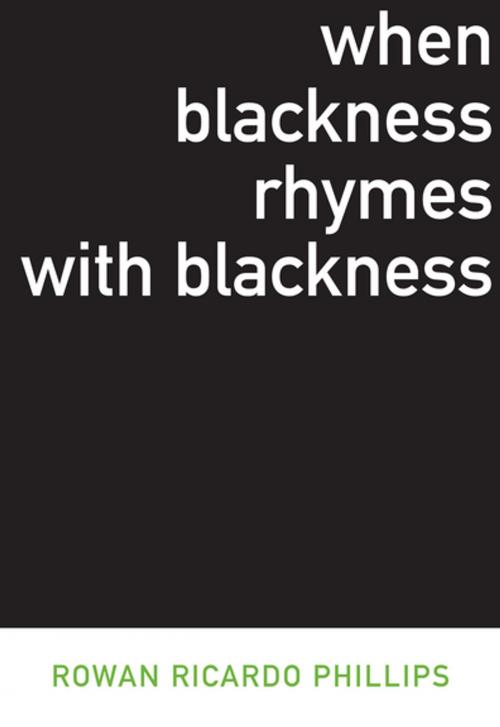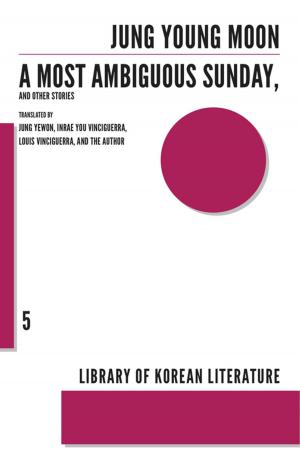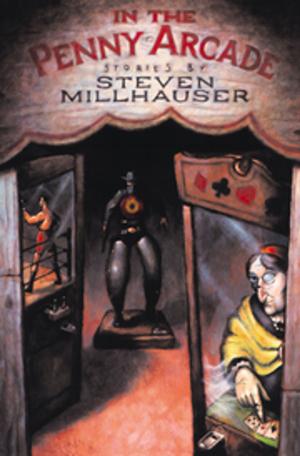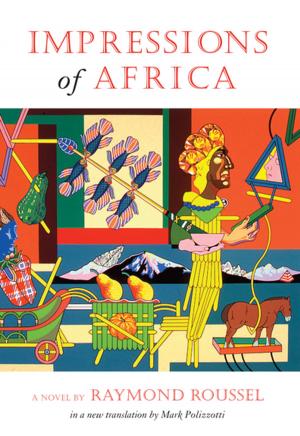When Blackness Rhymes with Blackness
Fiction & Literature, Literary Theory & Criticism, Poetry History & Criticism, Poetry, American| Author: | Rowan Ricardo Phillips | ISBN: | 9781564786197 |
| Publisher: | Dalkey Archive Press | Publication: | July 20, 2010 |
| Imprint: | Dalkey Archive Press | Language: | English |
| Author: | Rowan Ricardo Phillips |
| ISBN: | 9781564786197 |
| Publisher: | Dalkey Archive Press |
| Publication: | July 20, 2010 |
| Imprint: | Dalkey Archive Press |
| Language: | English |
In When Blackness Rhymes with Blackness, Rowan Ricardo Phillips pushes African American poetry to its limits by unraveling “our desire to think of African American poetry as African American poetry.” Phillips reads African American poetry as inherently allegorical and thus “a successful shorthand for the survival of a poetry but unsuccessful shorthand for the sustenance of its poems.” Arguing in favor of the “counterintuitive imagination,” Phillips demonstrates how these poems tend to refuse their logical insertion into a larger vision and instead dwell indefinitely at the crux between poetry and race, “where, when blackness rhymes with blackness, it is left for us to determine whether this juxtaposition contains a vital difference or is just mere repetition.”
From When Blackness Rhymes with Blackness:
Phillis Wheatley, like the epigraphs that writers fit into the beginning of their texts, is first and foremost a cultural sign, a performance. It is either in the midst of that performance (“at a concert”), or in that performance's retrospection (“in a café”), that a retrievable form emerges from the work of a poet whose biography casts a far longer shadow than her poems ever have. Next to Langston Hughes, of all African American poets Wheatley's visual image carries the most weight, recognizable to a larger audience by her famed frontispiece, her statue in Boston, and the drama behind the publication of her book, Poems on Various Subjects Religious and Moral. All of this will be fruit for discussion in the pages that follow. Yet, I will also be discussing the proleptic nature with which African American literature talks, if you will, Phillis Wheatley.
From When Blackness Rhymes with Blackness:
Phillis Wheatley, like the epigraphs that writers fit into the beginning of their texts, is first and foremost a cultural sign, a performance. It is either in the midst of that performance (“at a concert”), or in that performance's retrospection (“in a café”), that a retrievable form emerges from the work of a poet whose biography casts a far longer shadow than her poems ever have. Next to Langston Hughes, of all African American poets Wheatley's visual image carries the most weight, recognizable to a larger audience by her famed frontispiece, her statue in Boston, and the drama behind the publication of her book, Poems on Various Subjects Religious and Moral. All of this will be fruit for discussion in the pages that follow. Yet, I will also be discussing the proleptic nature with which African American literature talks, if you will, Phillis Wheatley.
In When Blackness Rhymes with Blackness, Rowan Ricardo Phillips pushes African American poetry to its limits by unraveling “our desire to think of African American poetry as African American poetry.” Phillips reads African American poetry as inherently allegorical and thus “a successful shorthand for the survival of a poetry but unsuccessful shorthand for the sustenance of its poems.” Arguing in favor of the “counterintuitive imagination,” Phillips demonstrates how these poems tend to refuse their logical insertion into a larger vision and instead dwell indefinitely at the crux between poetry and race, “where, when blackness rhymes with blackness, it is left for us to determine whether this juxtaposition contains a vital difference or is just mere repetition.”
From When Blackness Rhymes with Blackness:
Phillis Wheatley, like the epigraphs that writers fit into the beginning of their texts, is first and foremost a cultural sign, a performance. It is either in the midst of that performance (“at a concert”), or in that performance's retrospection (“in a café”), that a retrievable form emerges from the work of a poet whose biography casts a far longer shadow than her poems ever have. Next to Langston Hughes, of all African American poets Wheatley's visual image carries the most weight, recognizable to a larger audience by her famed frontispiece, her statue in Boston, and the drama behind the publication of her book, Poems on Various Subjects Religious and Moral. All of this will be fruit for discussion in the pages that follow. Yet, I will also be discussing the proleptic nature with which African American literature talks, if you will, Phillis Wheatley.
From When Blackness Rhymes with Blackness:
Phillis Wheatley, like the epigraphs that writers fit into the beginning of their texts, is first and foremost a cultural sign, a performance. It is either in the midst of that performance (“at a concert”), or in that performance's retrospection (“in a café”), that a retrievable form emerges from the work of a poet whose biography casts a far longer shadow than her poems ever have. Next to Langston Hughes, of all African American poets Wheatley's visual image carries the most weight, recognizable to a larger audience by her famed frontispiece, her statue in Boston, and the drama behind the publication of her book, Poems on Various Subjects Religious and Moral. All of this will be fruit for discussion in the pages that follow. Yet, I will also be discussing the proleptic nature with which African American literature talks, if you will, Phillis Wheatley.















